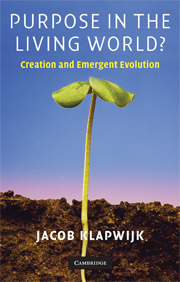Book contents
- Frontmatter
- Contents
- List of figures
- Preface
- Introduction
- 1 Does life on earth have a purpose?
- 2 Creationism, Intelligent Design, and Augustine's idea of time
- 3 Darwin, neo-Darwinism, and the naturalistic continuity claim
- 4 Miller's pre-biotic broth and the premises of evolutionism
- 5 A cold shudder along Darwin's back
- 6 The emergence theory of Morgan and Alexander
- 7 Luctor et emergo: what is emergent evolution?
- 8 Toward a general theory of emergent evolution
- 9 Hominization and the philosophy of mind
- 10 Augustinian faith and evolutionary science
- 11 The organism is a whole. The world is a habitat
- 12 The slumbering temptation of essentialism
- 13 Questions surrounding the emergence process
- 14 Enkapsis in nature. Is there an Omega point?
- Bibliography
- Index
12 - The slumbering temptation of essentialism
Published online by Cambridge University Press: 05 June 2012
- Frontmatter
- Contents
- List of figures
- Preface
- Introduction
- 1 Does life on earth have a purpose?
- 2 Creationism, Intelligent Design, and Augustine's idea of time
- 3 Darwin, neo-Darwinism, and the naturalistic continuity claim
- 4 Miller's pre-biotic broth and the premises of evolutionism
- 5 A cold shudder along Darwin's back
- 6 The emergence theory of Morgan and Alexander
- 7 Luctor et emergo: what is emergent evolution?
- 8 Toward a general theory of emergent evolution
- 9 Hominization and the philosophy of mind
- 10 Augustinian faith and evolutionary science
- 11 The organism is a whole. The world is a habitat
- 12 The slumbering temptation of essentialism
- 13 Questions surrounding the emergence process
- 14 Enkapsis in nature. Is there an Omega point?
- Bibliography
- Index
Summary
In preceding chapters I criticized the philosophical presuppositions of Darwinian naturalism. In this chapter I want to lay my own philosophical starting-points on the table. I will do this in a critical discussion with Herman Dooyeweerd, who was a philosopher at the Free University of Amsterdam and gained international attention with his magnum opus, A New Critique of Theoretical Thought. Dooyeweerd had serious scientific objections to the standard theory of evolution. In his “philosophy of the cosmonomic idea” he emphasized the meaning of the creation order, as I have also done. However, in his understanding of this creation order, he succumbed to the slumbering temptation of essentialism.
In this chapter I try to demonstrate that, beside creationism, essentialism can be regarded as one of the toughest strongholds of a conservative Christianity in its view of the living world. And I see Dooyeweerd as one of the most talented representatives of this essentialism.
I begin with a brief introduction to Dooyeweerd's philosophy; with him I argue for the necessity that philosophy bases itself on the standpoint of experience (section 1). In this connection I explain the difference between metaphysical and empirical philosophy (section 2). The modus operandi of a philosophy that is based on the standpoint of experience I present as the reflective-empirical method (section 3). I will show how the reflective-empirical method also applies to living nature, and how Dooyeweerd employs it to typify biological species (section 4).
- Type
- Chapter
- Information
- Purpose in the Living World?Creation and Emergent Evolution, pp. 234 - 258Publisher: Cambridge University PressPrint publication year: 2008

